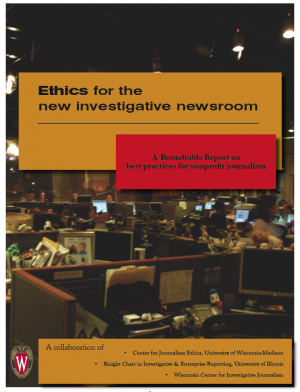Any journalistic endeavor has many stakeholders — the public, the media, policymakers and donors — and you will have to answer to them when they question your work or methodology. For that reason, you’ll want to establish policies that will protect your organization’s integrity, its mission and, ultimately, its survival.
Establish policies that will protect your organization’s integrity, its mission and, ultimately, its survival.
Key policy areas include conflicts of interest, ethics, fundraising, fact checking, use of volunteers, privacy of email addresses and other contact information that you might collect, and terms of use for those contributing to your website.
Conflict of interest policy
While you aren’t legally required to adopt a conflict of interest policy, doing so is considered “best practice” by experts in nonprofit management and by the IRS. Having a policy in place not only enables you to address potential conflicts of interests as they arise, it also helps fend off any subsequent charges of impropriety.
Admittedly, it takes a significant act of impropriety — such as using the nonprofit status as a front for a profit-making business — for an organization to forfeit its tax-exempt status. A number of nonprofits have survived allegations of impropriety and suffered no consequences after cleaning them up.
But you want to do the right thing. Furthermore, even a whiff of scandal can kill future donations.
The IRS even provides a sample conflict of interest policy in this PDF (see page 25).
Ethics policy
An ethics policy addresses such sensitive issues as how you will handle anonymous sources, what you’ll do when a story involves a donor and how you’ll deal with conflicts of interest.
An ethics policy tells journalists who work for you, as well as the public and donors, about your organization’s values. Specifically, it addresses such sensitive issues as how you will handle anonymous sources, what you’ll do when a story involves a donor and how you’ll deal with conflicts of interest.
Just as other organizations have done, we recommend you post your ethics policies online. Read the St. Louis Beacon’s Ethics Policy and the Wisconsin Center for Investigative Journalism Code of Ethics. WCIJ also has a Code of Ethical Conduct for Financial Managers.
For a comprehensive review of the ethics for online newsrooms, including fundraising, read a report by the Center for Journalism Ethics at the University of Wisconsin-Madison.
Fundraising policy
Will your organization publicly identify donors? Will you accept funding for specific projects or topics? And reject funding from certain people or institutions? This is where those policies should be stated, as transparently as possible.
Code of conduct policy
A code of conduct policy helps shape the newsroom climate, to make sure all employees and volunteers are aware of their obligation to conduct themselves professionally. If your organization is based at a university, your policy may also incorporate the university’s code of conduct, to assure university officials of your organization’s commitment to high standards.
Fact-checking policy
Fact-checking guidelines specify procedures for verifying the accuracy of news coverage and allow everyone — from contributors to donors to those writing in the comment section — to understand that their work may undergo review. An egregious error, especially in the early days of your organization, can destroy your credibility and, ultimately, your newsroom itself.
If students are involved in the reporting, be aware that they may bring tremendous energy but that their work will require a high level of oversight, including fact checking. Make your fact-checking policy clear from day one.
As you draft your policies, here are some additional questions to consider:
- How will your organization, funded by contributions from individuals and organizations, and sometimes supported by advertising and sponsorships, handle real or perceived conflicts of interest involving supporters? Board members?
- Will you insist that volunteer journalists and paid staff members adhere to the same standards?
- How can you ensure journalists do not stray into pure advocacy, but remain focused on journalism?
- In this new age of collaboration, how can your news organization partner with others that may have different standards? Whose rules apply? (For more on collaboration, see Step Eight.)
The board of directors should have the last word on all major policies, just as it retains final authority to make decisions based on the best business interests of the organization.
You may want to ask a small team — perhaps including board members and a consultant or volunteer expert — to draft policies for consideration by the board. Allow time for discussion and revisions, even if it means stretching the issue out over multiple meetings. The best policies can take weeks, perhaps months, to construct. After that, it’s advisable to revisit your policies on a regular basis — perhaps annually — to make sure they continue to reflect your values.
You can check out the policies of other organizations within publications provided by the Independent Sector. The Foundation Center can be a useful resource as well.

